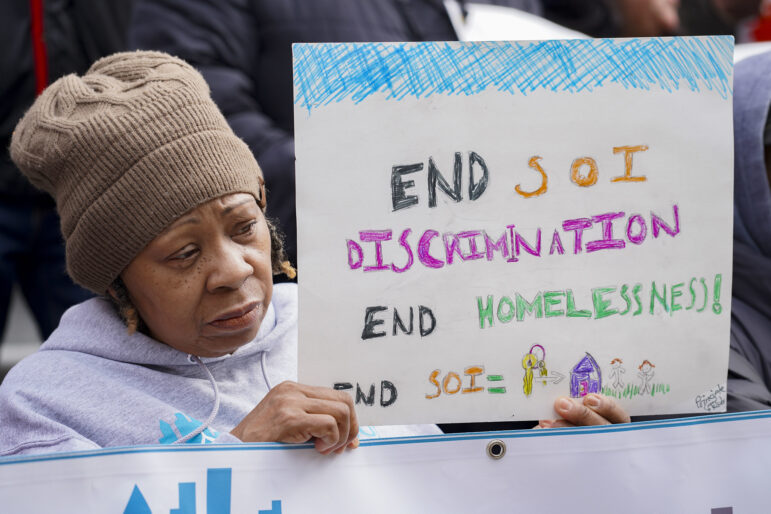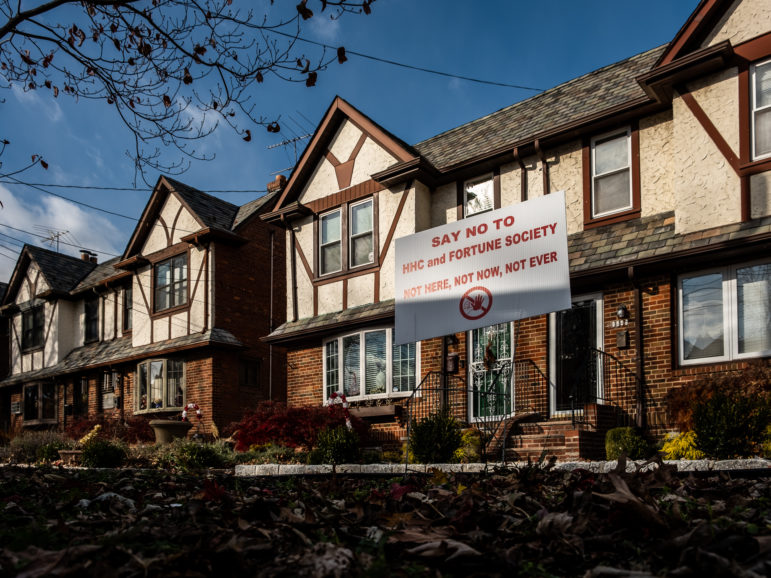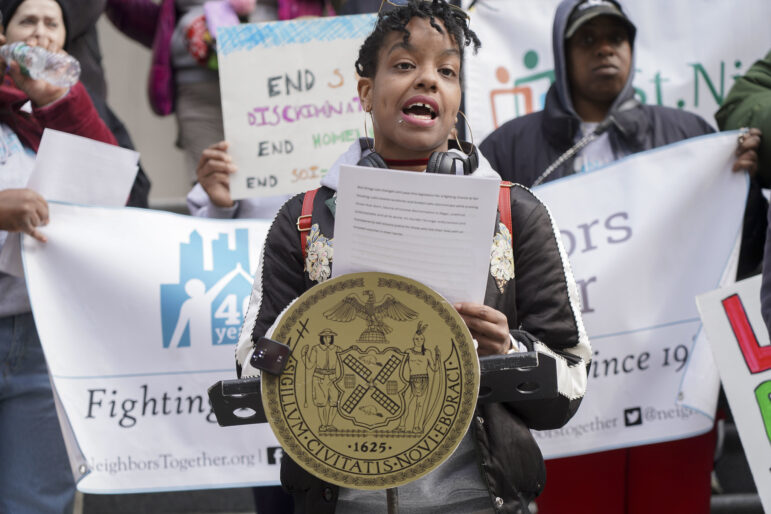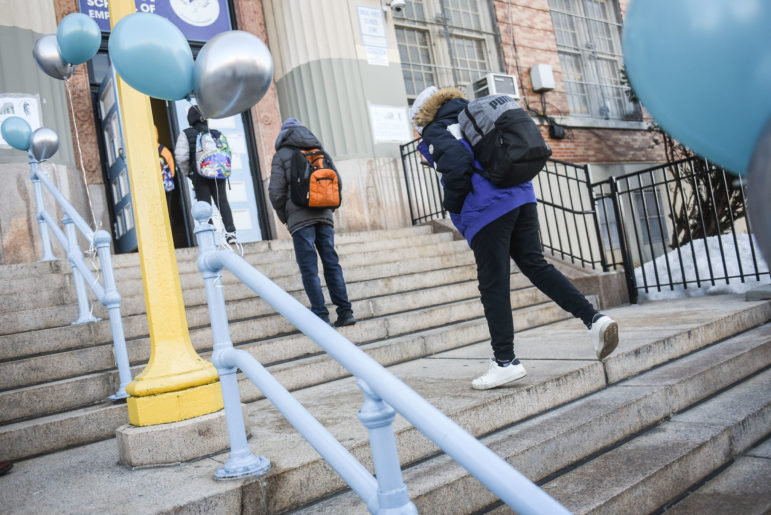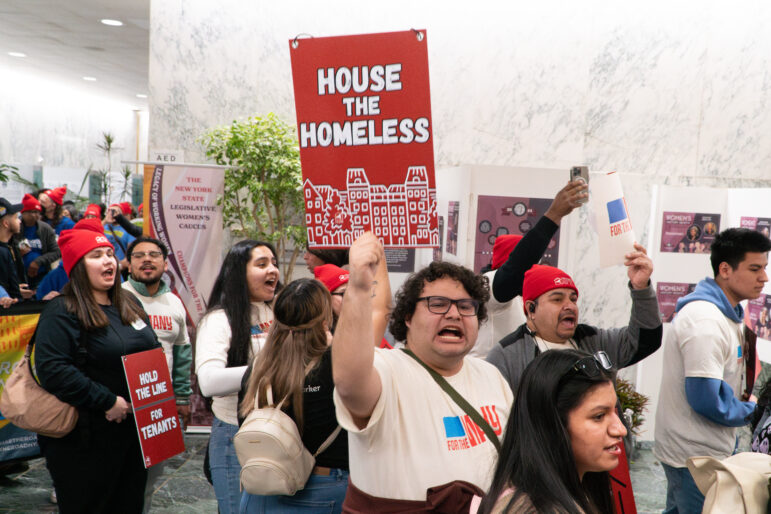Photo by: Jarrett Murphy
Liu works the room at the Van Dyke senior center, where ladies wore fancy hats for a post-Mother’s Day high tea.
This article is an installment in The Five Borough Ballot, a collaboration between City Limits, City & State and WNET’s MetroFocus. In each edition of the print and video series, we return to a location in each of the five boroughs to ask real New Yorkers their take on the 2013 election as it unfolds. For a complete overview of the series, go here
When a candidate for mayor enters the domain of Lisa Kenner—the president of the resident association at NYCHA’s sprawling Van Dyke Houses—he or she is welcomed as an honored guest. But that can be a time-consuming status.
When former Bronx borough president and current Independence Party nominee Adolfo Carrión came out to Brownsville to visit the Van Dyke community center in late April, he waited patiently for an hour, through a presentation about a GED program and a Q&A with the new manager of the Van Dyke development, before getting to make his stump speech.
Last week, Comptroller John Liu stopped by the Van Dyke senior center for a post-Mother’s Day “high tea” and waited nearly as long to make brief remarks. Then he was pressed into handing out awards honoring “Older Americans,” an achievement virtually everyone in the room except Liu could claim.
There’s no mystery why the wait is worthwhile to the mayoral hopefuls. In a primary that’s likely to feature five or six major candidates, every little pocket of voters counts. The assembly district in which the Van Dyke Houses sit cast 13,000 votes in the 2009 mayoral race, with 84 percent going to Democrat Bill Thompson.
But turnout in the two Assembly districts that encompass Brownsville was about 25 percent in that last mayoral race, even worse than the 29 percent citywide turnout rate.
There is a question in 2013 campaign probably as important as who will win. Namely, can the race somehow engage voters who’ve gotten used to staying home? And Brownsville frames that question. So what matters isn’t so much what Carrión or Liu said on their visits to Van Dyke, but what people in the seats heard.
Just a kid from the Bronx
Carrión spoke to a crowd of around 60 people on April 20, a brilliant Spring Saturday. “I’m just a kid from the Bronx trying to do the right thing,” Carrion told them as he took center-stage in the pale-green room. “The political process is failing our country. We want to change the relationship between our community and our government.”
He was introduced by local Independence Party leader Lenora Fulani, who said that Carrión —who was elected councilman and borough president on the Democratic line and then served in two Obama administration posts—became an Independent “because of his growing frustration with the fighting between Republican leaders and Democratic leaders and we get screwed in the process.” She didn’t mention Carrión’s bid to get on the Republican mayoral primary ballot, which had only recently failed.
The last Independence Party nominee, Mayor Bloomberg “took the third term a little too lightly and lost his connection with the people,” Carrión said. He noted that 71 percent of New York’s registered voters did not participate in that last mayoral election. “That is a crisis—a crisis for our country but more importantly a crisis for our community,” he said, telling the overwhelmingly black and Latino audience that decreased turnout meant the people deciding who runs the city “don’t look like us.”
“Beware the overpromisers,” Carrión continued, in an apparent shot at Liu’s crowd-pleasing calls for an $11.50 minimum wage and a complete end to stop-and-frisk. “We call them panderers. They know how to pluck at your heartstrings. People promising minimum wages we’ll never reach or doing away with things that we’ll never do away with. Don’t let them insult your intelligence. “
As Carrión spoke, one woman took copious notes. Another snapped pictures. When it came time for questions, Fort Greene resident Jacqueline Simmons asked him about the Whitman-Ingersoll projects, where hundreds of apartments have been vacant for years as a renovation dragged out, spurring suspicion of a plot to remove public housing from the gentrifying neighborhood. “That was the Democratic Party who did that,” Simmons said. “They took the housing projects from the public.” (For the record, the Whitman-Ingersoll renovations were launched when Republicans controlled HUD and the mayoralty.) Carrión answered vaguely.
Afterward, Lawona Wilson sized up Carrión’s odds. “Ugh. I think he has a chance. He needs to come out more to the developments,” she said. “I want someone who can help us. Especially the lower class.”
“He definitely got my attention,” said Jesse Watkins, who lives in Crown Heights. But it’s quite a long way to go until Election Day, he noted. He’s looking for a candidate who understands, “It’s about community empowerment—that’s where the focus should be.”
Don’t forget Brownsville
“Sometimes you’ve got to sit down,” Kenner told Liu last Thursday as he waited—through an invocation, musical performances and a tribute to a recently deceased 50-year resident of the Van Dyke Houes, Hattie “Honey” Blunt. “You’re running all over the place.”
The perpetually hyperscheduled Liu took the advice gamely. “I feel the warmth,” he said, then got back to waiting.
When Liu finally did take the mic, he recalled meeting Kenner at a Take Back the Night event, referred to his stewardship of the city’s pension funds (“from which some of you ought to be receiving a check soon”) and presented a fairly brief message: that the next mayor has “got to five people opportunities, young and old alike.” Then came the Older American awards, which were so numerous Liu had to hand off the task to an aide and skip out.
Afterward, as the mostly-female crowd—many wearing fancy hats in keeping with the “high tea” theme—sipped coffee and snacked on glazed miniature cinnamon rolls and red-white-and-blue frosted cupcakes, Lucille Daniels weighed in on what Liu’s appearance meant. “His coming here makes a big difference,” said Daniels, who actually lives in Crown Heights but has been volunteering at the Van Dyke center for 18 years, never once calling in sick. “It’s what you see for yourself, personally.”
Asked how she makes up her mind who to vote for, she said, “I pray on it. Oh yes. I’m not one of those gullible people.” She also watches the TV news, channels 12 and 7 mostly. She would never take advice from a friend on who to vote for. “No. No. No. No. I don’t trust people,” she said, adding. “People like to be bought.”
A woman sitting next to Daniels asked what Liu was running for.
At another table, Oreathya Green, a Queens resident visiting her sister at Van Dyke, said she liked Liu; a former member of SEIU 1199, she had seen him before. “I always liked his technique,” she said. “I hope he doesn’t get lost like everybody else.”
“What we need are people who offer to do something for the poor instead of the rich. Technology is fine for people who can afford it,” she said. “Why not pay attention to that instead of the sugar in Pepsi or Coca-Cola?”
Like Daniels, Green says she gets her political information mostly from TV, especially channel 7. So do Carrie Price and John Moore, residents of East New York, just east of Brownsville. Price says she’ll vote for “whichever one has the best program for the people”—which she said means “make life easier” and, with a chuckle, “give us more money.” Price and Moore are brother and sister and their house suffered a fire on December 10; they’re still displaced. “Life is hard. I’m telling you, somebody needs to make it easier” to deal with insurance companies and contractors and bureaucracies, Price said.
But if Price articulated a retail approach to politics, Kenner was calling for something more wholesale. The idea behind bringing all these candidates out to Brownsville is not about individual transactions with government, but strength in numbers.
“Once we get a voting bloc, we’re going to be able to get things done. Nobody’s going to overlook Brownsville,” she said. She’d invited Carrión and Liu—and was extending invitations to other candidates—because “one of ’em is going to be mayor and I want them to know they met Lisa Kenner.”
But, she stressed, “we’re going to do this collectively.”


